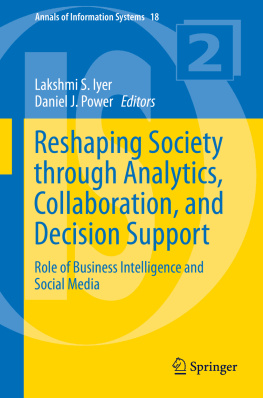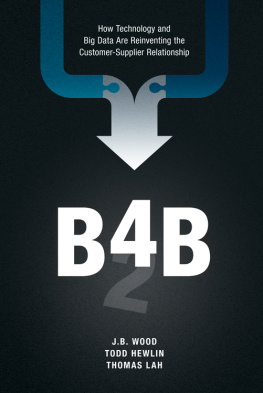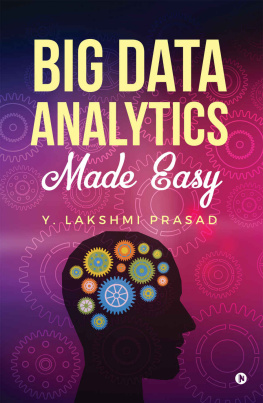1. Introduction
In Spring 2013, planning began for the Association for Information Systems (AIS) Special Interest Group on Decision Support Systems (SIGDSS) workshop for December 2013. The workshop was planned as an event associated with the International Conference on Information Systems (ICIS 2013) in Milan, Italy at Bocconi University from December 1418, 2013.
In keeping with the ICIS2013 theme of Reshaping Society, the 2013 SIGDSS Workshop aimed to bring together academic and industry professionals from around the world who have a passion for research and education innovation in Reshaping Society through Analytics, Collaboration, and Decision Support: Role of BI and Social Media.
This volume in the Annals of Information Systems reports papers originally reviewed for that workshop that were presented and subsequently revised and refined as chapters for this book. One relevant additional chapter that was not presented was also included. Track chairs also summarized presentations, panel comments and other relevant workshop materials not included as chapters.
A major purpose of the workshop was to bring together a core group of leading researchers in the field to discuss where computer involvement in human decisions is headed. Equally important is discussing the role of academic researchers in investigating current and future uses and in creating them. This volume endeavors to find a balance between systematizing what we know so we can teach our findings from prior research better and stimulate excitement to move the field in new directions. Computerized decision support and computing and information technologies can reshape our world, but potentially they can reshape it in negative as well as positive ways.
Teradata University Network (TUN) and Teradata ( http://www.teradata.com/ ) provided financial support for the workshop and helped with recruiting an Industry Keynote speaker. Teradata and TUN sponsored a reception for attendees the evening prior to the workshop.
Teradata University Network is a free, web-based portal that provides teaching and learning tools that is used by more than 45,000 students around the world, majoring in everything from information systems, management or computer science to finance, marketing or accounting. The resources and content support everything from Introduction to IT at the undergraduate level to graduate and executive level courses in big data and analytics. A key to the success of Teradata University Network is that it is led by academics to ensure the content will meet the needs of todays classrooms.
The workshop began with a Welcome by Ramesh Sharda, a Regents Professor at Oklahoma State University, Executive Director of TUN (teradatauniversitynetwork.com/) and Chair of the SIG DSS Advisory Board for 2012-1013. Then Barbara Dinter, the Panel Chair and Professor at Chemnitz University of Technology, Germany, introduced the Keynote speaker Davide Artioli from Credito Emiliano. Artioli spoke about the business intelligence journey at Credito Emiliano S.p.A. and its impact on reshaping the bank-customer relationship.
During the workshop, seven completed research papers were presented, nine research-in-progress short papers, three teaching and pedagogy papers including the TUN Teaching Award Winner presentation titled Effective use of Data and Decision Analytics to Improve Order Distribution in a Supply Chain by Michelle L.F. Cheong and Murphy Choy, Singapore Management University.
Professor Barbara Dinter moderated a distinguished panel titled A Swiss-Army Knife? The Profile of a Data Scientist. Panelists included: Sudha Ram, Eller College of Management at the University of Arizona; Roger Chiang, Carl H. Lindner College of Business, University of Cincinnati; Detlef Schoder, University of Cologne; and Francesco Mari, Vice President, Global Head SAP HANA Program SAP Custom Development.
The Research track identified research that promoted theoretical, design science, behavioral research and development of emerging applications in innovative areas of analytics, collaboration and decision support. The Research track co-chairs were Thilini Ariyachandra, Xavier University, and Amit Deokar, Dakota State University. They coordinated the review and revision process for the workshop and for the research chapters in this volume.
The Research track call for papers noted: Business Intelligence (BI)/ Decision Support (DSS)/ Analytics have become core to many businesses. The social media scape has come to modify and redefine not only businesses but also societal behavior and practices. Although addressed by research in the past few years, these domains are still evolving. For instance, the explosive growth in big data and social media analytics requires examination of the impact of these technologies and applications on business and society. Similarly, traditional approaches to collaboration and decision support are experiencing evolution and growth from BI and social media technologies and trends. As organizations in various sectors formulate IT strategies and investments, it is imperative to understand how various emerging technologies under the BI/DSS umbrella such as big data, mobile and wireless technologies, cloud computing, and recent collaboration tools can be used effectively for decision making in these organizations.
The Teaching track invited contributions that focus on pedagogical practices addressing acquisition, application, and continued development of the knowledge and skills required in the use of analytics, collaboration, and decision support systems. The Teaching track co-chairs were Babita Gupta, California State University Monterey Bay, and Uzma Raja, The University of Alabama, Tuscaloosa.
The Teaching track co-chairs noted in their call for teaching articles and cases studies that emerging technologies in business intelligence and social media are fueling a need for innovative curricula in online, traditional and hybrid delivery format that meets the industry needs. In keeping with the theme of Reshaping Society, we are seeking research contributions into the pedagogical practices that address acquisition, application, and continued development of the knowledge and skills required in the usage of analytics, collaboration, and decision support systems with special focus on business intelligence and social media.










